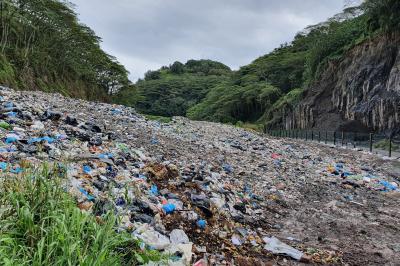Managing solid waste is critical for Pacific countries to reduce land and marine pollution and create a healthy and sustainable environment. Waste and pollution management is high priority for Pacific island countries. PRIF development partners and regional agencies, including the Secretariat for the Pacific Regional Environment Programme (SPREP), are dedicated to supporting development in the Pacific and protecting the environment. With over 12 million people, the Pacific faces significant challenges in providing sustainable solid waste management systems.
PRIF is involved in a collaborative effort to identify opportunities to strengthen recycling initiatives in Pacific island countries. PRIF partners including the EU, World Bank and JICA, the International Union for the Conservation of Nature (IUCN) and SPREP are cooperating to carry out waste audits, using a common standard methodology, in 15 Pacific island countries and are on target to complete the audits by July 2021. The waste audits of the 15 countries are expected to inform the proposed establishment of a regional recycling network.
PRIF, as a part of this initiative, has been responsible for the Cook Islands waste audit. Work commenced during COVID-19 in August 2020 over a 3 month period. Due to travel restrictions, the contractor, Tonkin & Taylor, mobilized technology to remotely train staff to collect waste data, view collection and track on a live basis, and develop GIS maps of sites. The use of technology had the additional benefit of developing local capabilities to undertake waste audits and meet safety requirements. The waste audit was carried out on Rarotonga and Aitutaki, the two most populated islands. The audit's main finding was that there are recycling opportunities, as there are significant household waste components, including hygiene products, organic waste, metal, paper/cardboard, and single-use items. Other findings were that there has been a reduction in waste sent to Rarotonga Landfill since COVID 19, reducing waste to landfill by around 27 per cent, and there is also a reasonable willingness to pay in communities for waste collection services.
The next step after all the waste audits have been completed will be for PRIF partners and regional agencies to work together on the scoping study to consider the feasibility of establishing a regional recycling hub.

